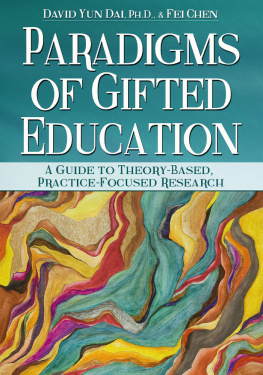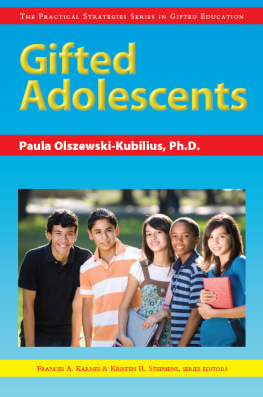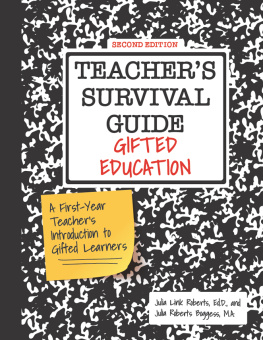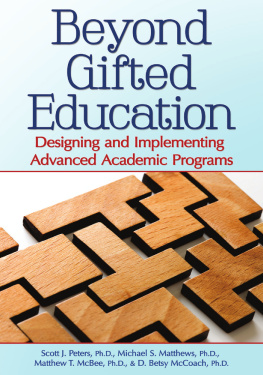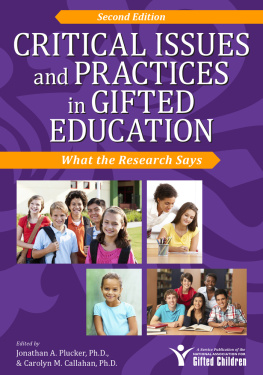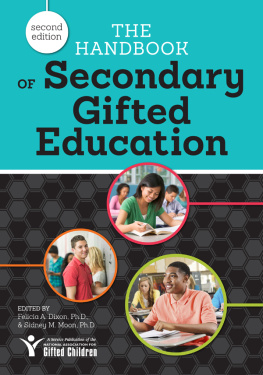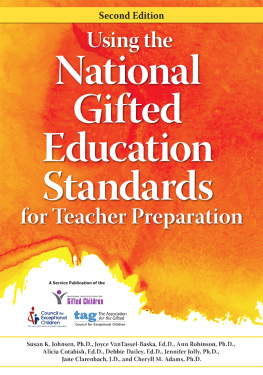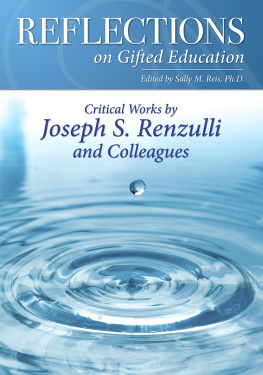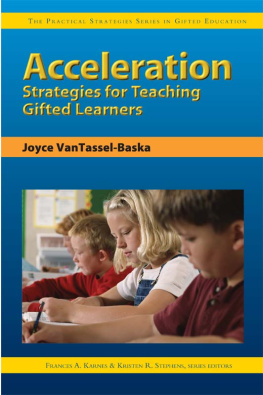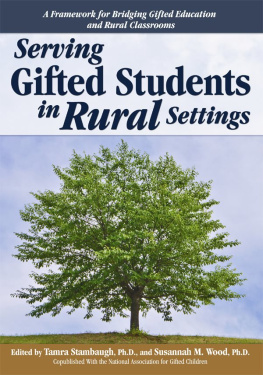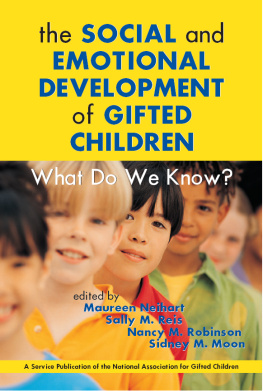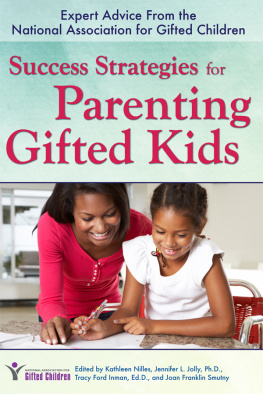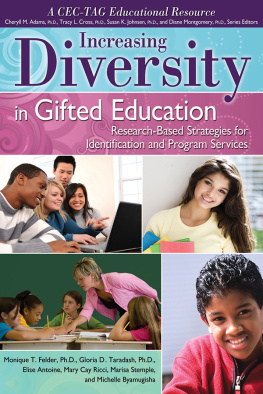References
Abelson, R. P. (1995). Statistics as principled argument. Hillsdale, NJ: Lawrence Erlbaum.
Ackerman, C. M. (2009). The essential elements of Dabrowskis theory of positive disintegration and how they are connected. Roeper Review, 31, 8195.
Ackerman, P. L. (1988). Determinants of individual differences during skill acquisition: Cognitive abilities and information processing. Journal of Experimental Psychology: General, 117, 288318.
Ackerman, P. L. (2003). Aptitude complexes and trait complexes. Educational Psychologist, 38, 8593.
Ackerman, P. L., & Heggestad, E. D. (1997). Intelligence, personality, and interests: Evidence for overlapping traits. Psychological Bulletin, 121, 219245.
Adelson, J. L., & Carpenter, B. D. (2011). Grouping for achievement gains: For whom does achievement grouping increase kindergarten reading growth? Gifted Child Quarterly, 55, 265278. doi:10.1177/0016986211417306
Adelson, J. L., McCoach, D. B., & Gavin, M. K. (2012). Examining the effects of gifted programming in mathematics and reading using the ECLS-K. Gifted Child Quarterly, 56, 2539. doi:10.1177/0016986211431487
Alexander, P. A. (2004). A model of domain learning: Reinterpreting expertise as a multidimensional, multistage process. In D. Y. Dai & R. J. Sternberg (Eds.), Motivation, emotion, and cognition: Integrative perspectives on intellectual functioning and development (pp. 273298). Mahwah, NJ: Lawrence Erlbaum.
Allport, G. W. (1937). Patterns and growth in personality. New York, NY: Holt, Rinehart & Winston.
Al-Hroub, A. (2011). Developing assessment profiles for mathematically gifted children with learning difficulties at three schools in Cambridgeshire, England. Journal for the Education of the Gifted, 34, 744. doi:10.1177/016235321003400102
Ambrose, D. (2000). World-view entrapment: Moral-ethical implications for gifted education. Journal for the Education of the Gifted, 23, 159186.
Ambrose, D. (2003). Barriers to aspiration development and self-fulfillment: Interdisciplinary insights for talent discovery. Gifted Child Quarterly, 47, 282294.
Ambrose, D. (2000). World-view entrapment: Moral-ethical implications for gifted education. Journal for the Education of the Gifted, 23, 159186.
Ambrose, D., VanTassel-Baska, J., Coleman, L. J., & Cross, T. L. (2010). Unified, insular, firmly policed, or fractured, porous, contested, gifted education? Journal for the Education of the Gifted, 33, 453478.
American Association on Mental Retardation. (1992). Mental retardation: Definition, classification, and systems of supports (9th ed.). Washington, DC: Author.
American Educational Research Association, American Psychological Association, & National Council on Measurement in Education (1999). Standards for educational and psychological testing. Washington, DC: American Educational Research Association.
Angoff, W. H. (1988). The nature-nurture debate, aptitudes, and group differences. American Psychologist, 43, 713720.
Archambault, F. X., Jr., Westberg, K. L., Brown, S. W., Hallmark, B. W., Emmons, C. L., & Zhang, W. (1993). Classroom practices used with gifted third and fourth grade students. Journal for the Education of the Gifted, 16, 103119.
Assouline, S. G., Foley Nicpon, M., & Whiteman, C. (2010). Cognitive and psychosocial characteristics of gifted students with written language disability. Gifted Child Quarterly, 54, 102115. doi:10.1177/0016986209355974
Aulls, M. W., & Shore, B. M. (2008). Inquiry in education: The conceptual foundations for research as a curricular imperative. New York, NY: Lawrence Erlbaum.
Baker, E. L. (2007). The end(s) of testing. Educational Researcher, 36, 309317.
Bamberger, J. (1986). Cognitive issues in the development of musically gifted children. In R. J. Sternberg & J. E. Davidson (Eds.), Conceptions of giftedness (pp. 388413). Cambridge, England: Cambridge University Press.
Bandura, A. (1986). Social foundations of thought and action: A social cognitive theory. Englewood Cliffs, NJ: Prentice Hall.
Bartlett, F. C. (1932). Remembering: A study in experimental and social psychology. Cambridge, England: Cambridge University Press.
Barron, B. (2006). Interest and self-sustained learning as catalysts of development: A learning ecology perspective. Human Development, 49, 193224.
Beltman, S., & Volet, S. (2007). Exploring the complex and dynamic nature of sustained motivation. European Psychologist, 12, 314323.
Bereiter, C., & Scardamalia, M. (1993). Surpassing ourselves: An inquiry into the nature and implications of expertise. La Salle, IL: Open Court.
Berliner, D. C., & Biddle, R. J. (1995). The manufactured crisis: Myths, fraud, and the attack on Americas public schools. Reading, MA: Addison-Wesley.
Bernal, E. M. (2003). To no longer educate the gifted: Programming for gifted students beyond the era of inclusionism. Gifted Child Quarterly, 47, 183191. doi:10.1177/001698620304700302
Betts, G. T., & Neihart, M. (1988). Profiles of the gifted and talented. Gifted Child Quarterly, 32, 248253. doi:10.1177/001698628803200202
Betts, G. T., & Neihart, M. (2004). Profiles of the gifted and talented. In R. Sternberg (Ed.), Definitions and conceptions of giftedness (pp. 97106). Thousand Oaks, CA: Corwin Press.
Beutler, L. E., & Rosner, R. (1995). Introduction to psychological assessment. In L. E. Beutler & R. Rosner (Eds.), Integrative assessment of adult personality (pp. 124). New York, NY: The Guilford Press.
Blackburn, S. (2008). The Oxford dictionary of philosophy. New York, NY: Oxford University Press.
Bleske-Rechek, A., Lubinski, D., & Benbow, C. (2004). Meeting the educational needs of special populations: Advanced Placements role in developing exceptional human capital. Psychological Science, 15, 217224.
Block, J. (2002). Personality as an affect-processing system: Toward an integrative system. Mahwah, NJ: Lawrence Erlbaum.
Bloom, B. S. (1985). Developing talent in young people. New York, NY: Ballantine Books.
Boekaerts, M. (1993). Being concerned with well-being and with learning. Educational Psychologist, 28, 149167.
Borkowski, J. G., & Peck, V. A. (1986). Causes and consequences of metamemory in gifted children. In R. J. Sternberg & J. E. Davidson (Eds.), Conceptions of giftedness (pp. 182200). Cambridge, England: Cambridge University Press.
Borland, J. H. (1997). Evaluating gifted programs. In N. Colangelo & G. A. Davis (Eds.), Handbook of gifted education (2nd ed., pp. 253266). Boston, MA: Allyn & Bacon.
Borland, J. H. (2003). The death of giftedness. In J. H. Borland (Ed.), Rethinking gifted education (pp. 105124). New York, NY: Teachers College Press.
Borland, J. H. (2005). Gifted education without gifted children: The case for no conception of giftedness. In R. J. Sternberg & J. E. Davidson (Eds.), Conceptions of giftedness (2nd ed., pp. 119). Cambridge, England: Cambridge University Press.
Borland, J. H. (2008). Identification. In J. A. Plucker & C. M. Callahan (Eds.), Critical issues and practices in gifted education: What the research says (pp. 261280). Waco, TX: Prufrock Press.
Borland, J. H. (2012). A landmark monograph in gifted education, and why I disagree with its major conclusion. The Creativity Post. Retrieved from http://www.creativitypost.com/education/a_landmark_monograph_in_gifted_education_and_why_i_disagree_with_its_major
Borland, J. H., Horton, D., Subotnik, R. F., Shiang-Jiun, C., Miran, C., Freeman, C., & Yu, J. (2002). Ability-grouping and acceleration of gifted students: Articles from the
Next page
